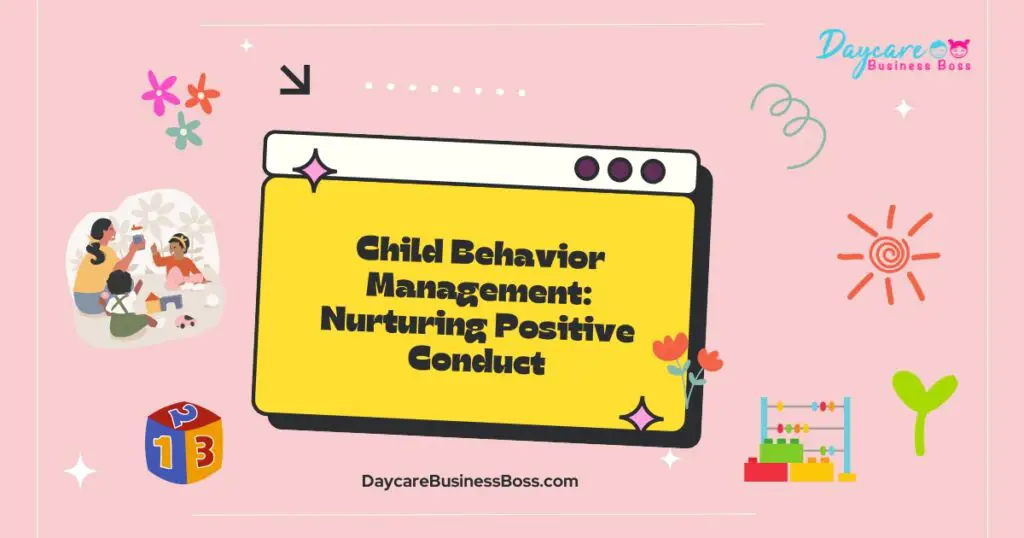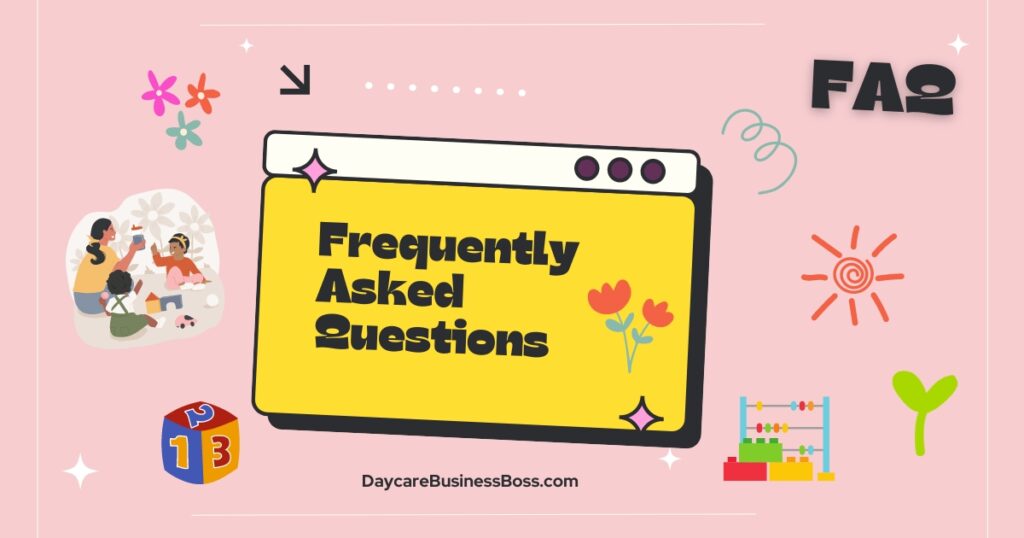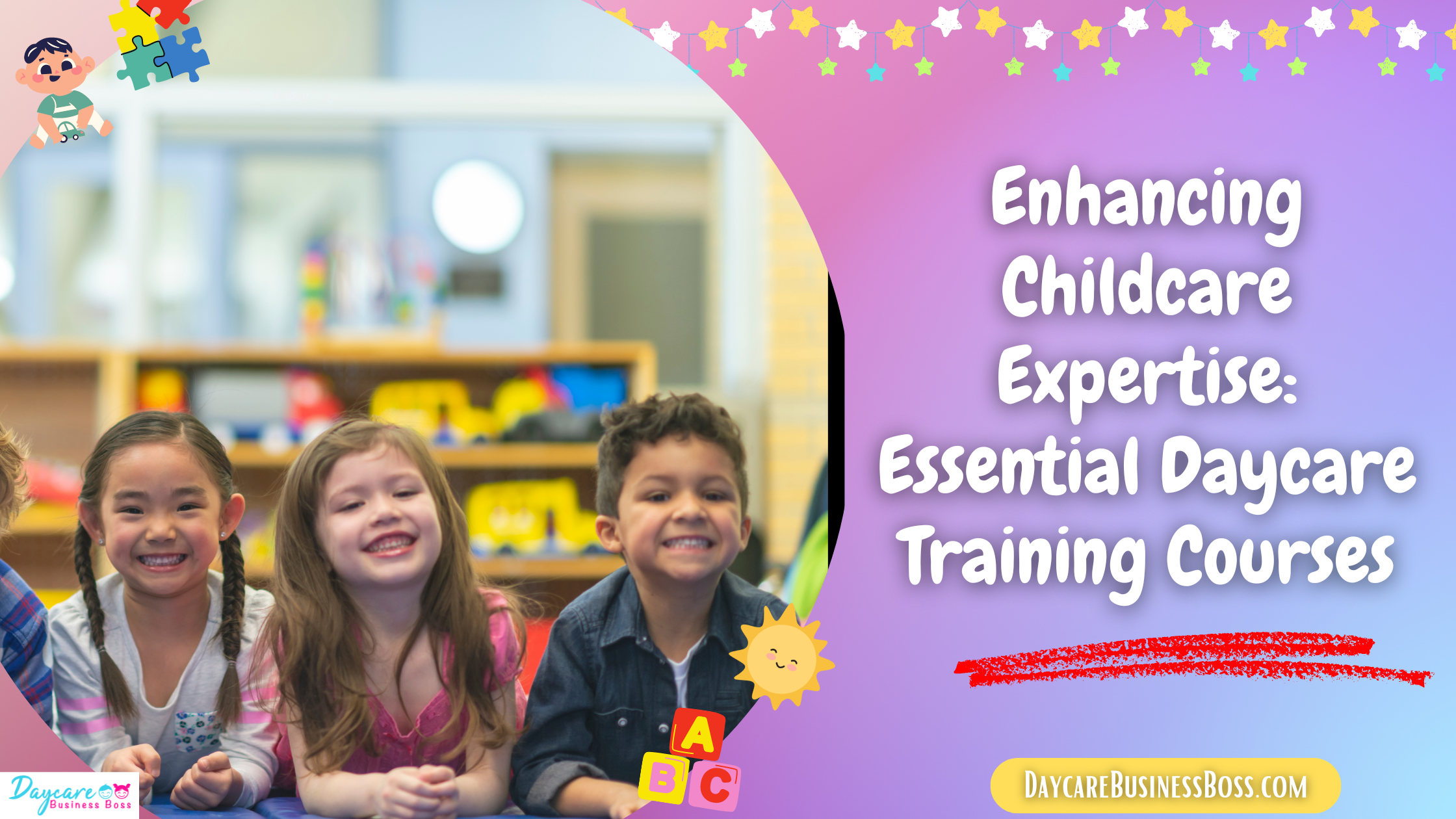Caregivers play a vital role in the realm of childcare, where the sensitive seeds of inquiry, growth, and development are sowed. Guiding young brains in their formative years takes more than simply a kind heart; it necessitates a thorough understanding of child psychology, safety regulations, and teaching methods. This is where childcare training courses come in, acting as a beacon illuminating the route to becoming an amazing daycare provider.
The most useful daycare training courses commonly include Early Childhood Development, Pediatric First Aid/CPR, Child Behavior Management, Curriculum Planning, and Health & Safety Procedures.
In this article, we dig into the realm of daycare training courses, revealing the critical components that enable caregivers to flourish in their roles. Join us on an exploration of how these training courses influence not only the abilities of caregivers but also the futures of the young minds they nurture.
Early Childhood Development: Fostering Growth and Learning
A thorough understanding of the fundamental concepts of Early Childhood Development (ECD) is at the heart of competent childcare. This information is the foundation upon which caregivers and childcare providers design effective strategies to nurture and assist children’s development during their critical formative years. Armed with the knowledge of children’s physical, cognitive, and socio-emotional development, these caregivers are well-positioned to deliver meaningful experiences that are also suited to each child’s developmental requirements.
ECD training goes beyond the fundamentals of childcare and delves into the complexities of childhood development. Daycare providers get the capacity to effectively measure a child’s progress by becoming familiar with developmental milestones and stages. This enables them to detect any delays or difficulties early on, allowing for prompt interventions that can have a substantial impact on a child’s overall development. Such interventions can include anything from targeted exercises to boost motor abilities to creating an environment that stimulates peer social interaction.
A critical component of ECD training is providing caregivers with ways to promote specific areas of growth. Language acquisition, for example, is a multidimensional process that occurs quickly during childhood. Daycare providers might use their training to adopt approaches that stimulate linguistic curiosity. This may include engaging youngsters in talks, reading aloud, and interactive storytelling, all of which contribute to the development of strong language abilities.
Knowing cognitive development assists caregivers in designing activities that challenge but do not overwhelm young minds. Problem-solving and critical thinking games and puzzles are effortlessly incorporated into daily routines, increasing mental agility and encouraging a lifetime love of learning.
However, ECD training goes beyond the obvious characteristics of development. The foundation of a child’s capacity to manage relationships and regulate emotions is their socio-emotional development. Caregivers who understand this aspect of development can create a setting that fosters empathy, emotional intelligence, and resilience. They understand that every child’s path is unique, with different strengths and challenges. This realization serves as the foundation for an inclusive approach in which each child’s uniqueness is celebrated and nurtured.
Read more about: Day Care Done Right: Embracing the Power of the Development Checklist
Pediatric First Aid/CPR: Swift Responses in Times of Crisis
The capacity to respond effectively to emergencies is critical in the dynamic world of childcare, where each day brings new adventures and problems. Childcare caregivers are frequently faced with unanticipated situations that necessitate quick and accurate action. This is where Pediatric First Aid and CPR training comes into play, as it provides caregivers with vital life-saving skills that can mean the difference between life and death in crucial situations.
Within a daycare setting, the range of potential emergencies is wide, ranging from small mishaps to potentially life-threatening scenarios. These circumstances, ranging from a youngster choking on a little object to incurring injuries during recreation, demand prompt and proper medical attention. Pediatric First Aid and CPR training provides caregivers with the tools and information they need to respond to these events quickly.
The ability to give CPR (Cardiopulmonary Resuscitation), which can restore blood circulation and oxygen delivery to a child’s essential organs following a cardiac arrest, is one of the most important aspects of this training. Using the strategies taught in this program, childcare providers can intervene quickly, perhaps saving a child’s life while waiting for professional medical help.
The training teaches critical skills for dealing with choking accidents, which are common in young toddlers who are prone to investigating their environment with their mouths. Caregivers who know how to execute the Heimlich technique on an infant or kid can quickly dislodge an obstructing object and restore normal breathing.
Pediatric First Aid and CPR training, in addition to providing direct life-saving skills, instills confidence in childcare providers. The awareness that they are prepared to respond effectively to emergencies instills confidence in their skills. This self-assurance then rubs off on their interactions with the children in their care, resulting in a safe and secure environment that supports healthy development and learning.
When parents entrust their most precious possessions to childcare providers, they naturally want assurance that their children are in capable hands. Pediatric First Aid and CPR training are tangible indicators of a caregiver’s dedication to the well-being of the children. This training sends a clear message to parents that their child’s safety and health are a major priority, instilling confidence in the childcare provider’s abilities.
Child Behavior Management: Nurturing Positive Conduct

Navigating the different tapestry of personalities and behaviors in a daycare setting is an ongoing challenge that necessitates a skillful and compassionate approach. Childcare workers work with young minds that are filled with curiosity, emotions, and individual tendencies. In this complex landscape, the value of Child Behavior Management training emerges as a guiding light, providing caregivers with the tools and tactics they need to nurture positive behavior and effectively address tough situations.
Child Behavior Management training is a comprehensive framework that provides daycare workers with a range of practical approaches for navigating the complicated terrain of children’s behavior. This program dives into the underlying motives and triggers that drive a child’s conduct, with the understanding that behavior is a form of communication. With this knowledge, caregivers can modify their reactions to encourage positive behavior and address difficulties before they become serious.
Patience is a key component of effective Child Behavior Management. This training enables caregivers to be calm and understanding in all situations. Caregivers are trained to pause, examine the underlying cause, and respond in a way that matches the child’s emotional and developmental needs rather than reacting impulsively to disruptive behavior. This method not only de-escalates potentially volatile situations but also demonstrates emotional regulation to the youngsters in their care.
Another essential skill highlighted in Child Behavior Management training is effective communication. Caregivers learn how to interact with children in ways that promote understanding and mutual respect. Caregivers create an environment where open communication is valued by carefully listening to a child’s problems and perspectives, helping children to express themselves more constructively. This not only encourages positive conduct but also fosters cognitive and social development in children.
This training instills ways to promote empathy and emotional growth. Caregivers are directed to assisting children in identifying and expressing their emotions, so promoting emotional intelligence and self-awareness. Children’s incidences of problematic conduct frequently diminish as they become more proficient at detecting and managing their emotions.
Child Behavior Management training creates the groundwork for beneficial behavioral patterns by providing a pleasant environment that encourages cooperation. Caregivers recognize that each child is unique, therefore their answers are tailored to their specific requirements. This individualized approach not only develops a sense of belonging but also enables youngsters to identify their worth within the group.
Curriculum Planning: Cultivating Learning through Play
Childhood, defined by limitless curiosity and an intrinsic sense of wonder, is a period of exponential growth and learning, assisted mostly via exploration and play. This critical stage of development in the realm of childcare has resulted in the acknowledgment of the significant impact of Curriculum Planning training. This program acts as a catalyst, equipping childcare providers with the ability to design purposeful and engaging activities that stimulate not only creativity, critical thinking, and problem-solving, but also overall development in young brains.
Curriculum Planning training provides a systematic framework that enables caregivers to organize engaging and meaningful learning experiences. The training provides providers with insights into the unique ways children absorb knowledge, prompting them to create activities that reflect the dynamic character of early childhood learning. Caregivers can build situations that encourage active engagement and exploration by leveraging children’s natural curiosity and drive to explore.
Tailoring lessons to children’s interests and developmental levels is a basic tenet of Curriculum Planning. This individualized approach not only ensures that the content is relevant to each child, but also promotes deeper engagement with the subject matter. Children are more likely to be motivated and passionate learners when they find a direct connection between what they are learning and their own experiences and passions.
Curriculum Planning training highlights the significance of balancing scheduled learning with unstructured play. Caregivers are urged to establish a balance between teacher-directed activities and child-led inquiry. As children learn to communicate, negotiate, and navigate their learning paths, this balanced approach not only supports cognitive development but also fosters social skills, emotional intelligence, and self-regulation.
A well-structured curriculum serves as a foundation for varied growth. Caregivers set the framework for lifetime learning skills by actively adding activities that stimulate creativity, critical thinking, and problem-solving. Children learn to face challenges with grit and to consider numerous options for answers. This not only improves their cognitive ability but also gives them confidence in their abilities.
The importance of Curriculum Planning training cannot be overstated. Children acquire a lifetime love of learning when they participate in fascinating activities that inspire their imaginations, curiosity, and thirst for information. This foundation of learning excitement prepares students to adapt to new educational situations and fuels their continued personal and professional development.
Read more about: Innovating Childcare: Strategic Business Planning for Nonprofit Daycare Centers
Health & Safety Procedures: Creating Secure Environments
Unrelenting dedication to safety is a key pillar in the field of childcare. Recognizing the critical need of protecting every child’s well-being, Health & Safety Procedures training plays a critical role. This comprehensive training provides caregivers with a thorough understanding of hygiene, sanitation, and accident prevention, enabling them to foster an atmosphere that prioritizes the safety and health of the children in their care.
Health and safety procedures training is a comprehensive curriculum that covers a wide range of necessary knowledge and abilities. Caregivers delve into the complexities of maintaining a clean and sanitary environment, realizing that children’s immune systems are still developing, making them more vulnerable to diseases. This course teaches correct handwashing techniques, food handling and storage safety, and effective cleaning and sanitization processes. Caregivers who follow these principles create a setting in which the risk of disease is reduced, allowing children to thrive in a healthy environment.
Another important aspect of Health & Safety Procedures training is accident prevention. Caregivers learn how to detect potential hazards and adopt childproofing precautions ahead of time. These preventative actions, ranging from securing sharp objects and electrical outlets to selecting age-appropriate toys, reduce the chance of accidents and injury. This training instills in caretakers an alert and proactive mindset, allowing them to anticipate and avoid potential hazards.
A safe and sanitary daycare setting not only protects the children’s physical health but also has a significant impact on their mental well-being. Children are more likely to participate actively in learning and social activities when they feel safe and protected. This good setting fosters a sense of belonging and trust, which is essential for healthy emotional development.
Health & Safety Procedures training provides parents with confidence when committing their children’s care to childcare providers. Parents take solace in knowing that their children are in a safe and secure setting that adheres to stringent health and safety requirements. Caregivers’ rigorous training demonstrates their commitment to giving the finest possible care, instilling confidence and trust in the childcare center.
Frequently Asked Questions

What are the most important daycare training courses that providers should look into?
Daycare training includes a variety of essential courses that will help you improve your childcare skills. These include Early Childhood Development to understand growth milestones, Pediatric First Aid/CPR to be prepared for an emergency, Child Behavior Management to effectively manage behavior, Curriculum Planning to create engaging learning experiences, and Health & Safety Procedures to ensure a safe environment.
What are the advantages of Child Behavior Management training for childcare providers?
Child Behavior Management course provides daycare providers with skills for dealing with a wide range of misbehavior and encouraging positive behavior. Caregivers learn skills for creating a happy environment that is based on empathy, communication, and patience. This program equips caregivers to encourage cooperation, emotional growth, and conflict resolution in the children in their care.
What makes Curriculum Planning such an important daycare training course?
Curriculum planning is essential because it enables childcare providers to provide engaging activities that are in line with children’s developmental stages and interests. This course makes learning enjoyable by encouraging creativity, critical thinking, and problem-solving abilities. A well-structured curriculum lays the groundwork for young children’s overall cognitive, emotional, and social development.
To learn more on how to start your own daycare checkout my startup documents here.
The information provided by DaycareBusinessBoss.com (“The Site”) is for general informational purposes only. All information on the Site is provided in good faith, however, we make no representation or warranty of any kind, express or implied, regarding the accuracy, adequacy, validity, reliability, availability or completeness of any information on the Site. Under no circumstance shall we have any liability to you for any loss or damage of any kind incurred as a result of the use of the Site or Reliance on any information provided on the Site. Your use of the Site and your reliance on any information on the Site is solely at your own risk.
This blog post is for educational purposes only and does not constitute legal advice. Please consult a legal expert to address your specific needs. Terms and Conditions. (https://daycarebusinessboss.com/terms-conditions/)

Meet Shawn Chun: Entrepreneur and Childcare Business Fan.
I’m a happy individual who happens to be an entrepreneur. I have owned several types of businesses in my life from a coffee shop to an import and export business to an online review business plus a few more and now I create online daycare business resources for those interested in starting new ventures. It’s demanding work but I love it. I do it for those passionate about their business and their goals. That’s why when I meet a childcare business owner, I see myself. I know how hard the struggle is to retain clients, find good employees and keep the business growing all while trying to stay competitive.
That’s why I created Daycare Business Boss: I want to help childcare business owners like you build a thriving business that brings you endless joy and supports your ideal lifestyle.

